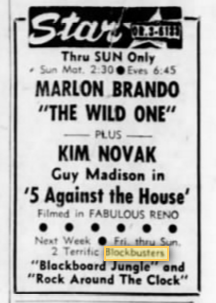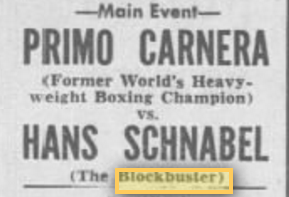The earliest reference I can find to "blockbuster" in reference to films specifically is in a newspaper advertisement from 1957, but given the perfunctory use in the advertisement, I suspect there are earlier cases I haven't found.
Next week... two terrific blockbusters.

-The News-Review -- Saturday, January 5, 1957 (paywall link)
As Josh mentioned, the term previously referred to large destructive bombs in World War II. Like etymonline, OED attests it to 1943:
1943 London Times 22 Dec. 4/5 Bombs were falling..many 8,000 lb. and 4,000 lb. ‘block~busters’ among them.
As early as in 1950, the term had an entertainment context, as "The Blockbuster" was a nickname for the wrestler Hans Schnabel.

Interestingly, in 1944 there was a film comedy called Block Busters, likely a comic appropriation of the term derived from the military origin. From Wikipedia:
After an afternoon of playing baseball, Muggs McGinnis (Leo Gorcey) and the East Side Kids gang arrive at the door of their clubhouse, where a man named Higgins (silent comedian Harry Langdon, in one of his last film appearances) is removing their "East Side Club" sign. Higgins explains that the owner of the place plans to rent it to some "respectable" tenants. When Muggs learns that the new tenants are due to examine the place at noon the following day, he plans to frighten them away by picking a fight with Butch (Billy Benedict) and the Five Pointers, a rival gang.


